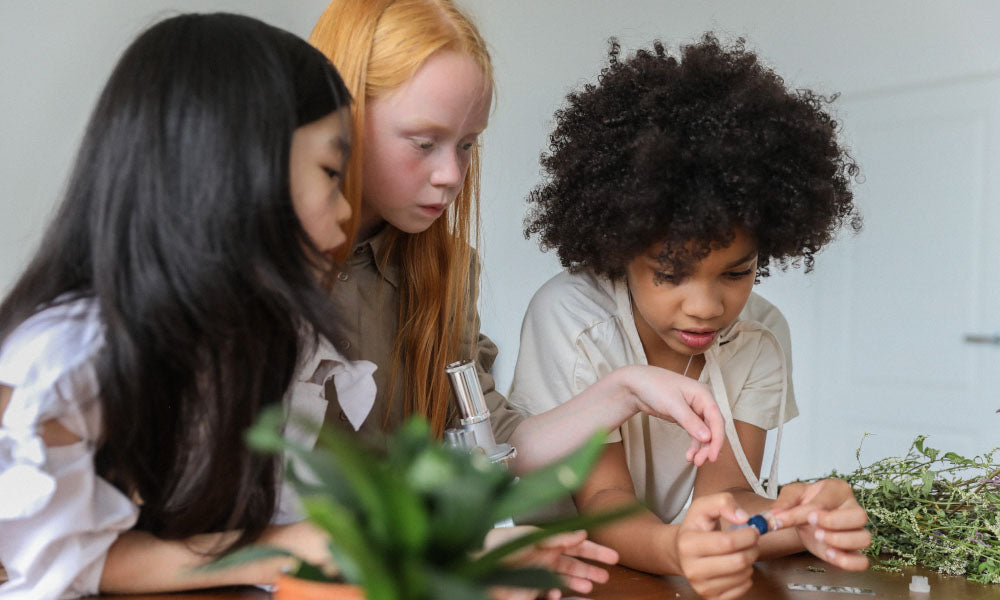STEAM stands for science, technology, engineering, arts and mathematics, and STEAM learning represents a full educational philosophy that teaches practical skills, encourages curiosity and embraces an interdisciplinary approach.
Not only do women working in STEAM tend to earn more money than women in non-STEAM fields, but their perspective can reveal problems, solutions, and markets that male researchers may have overlooked. Here are ten ways you can help your daughter fall in love with STEAM.
1 | Praise her for working hard rather than being smartFocus on the attributes she can change rather than concrete attributes. Telling her she’s smart or ‘good at math’ can be discouraging when she encounters subjects that she may find more difficult. In other words, focus paise on process rather than outcome.
Tell her you’re proud of how hard she studied for the science test or how she didn’t give up on the math problems. If you reinforce positive study habits, she’s more likely to keep up those habits when she’s struggling.
2 | Ask her how she thinks things are made
Have a conversation about the way things are made, whether it’s computer programs, video games, or the layout of the telephone poles. Make a game of pointing out ordinary things and talking about the people who make them.
By demystifying building and designing, you change her worldview. She’ll start to wonder what she can build and what problems in the world need to be solved. From there, it’s only a matter of experimentation.
3 | Encourage experimentation
When your daughter comes to you with a question, ask her how she can figure it out on her own. Ask her to try new things without fearing that it won’t work.
If she wants to change a recipe, let her try and see what happens. If she wants to a new desk, let her design one and see if it works. Experimentation is a great way for her to learn new skills, ideas, and ways to think about problems.
4 | Don’t gender her passions or let anyone else do it
Keeping gender out of STEAM is more difficult than you might imagine. If she likes coding or making apps, don’t make a big deal out of it in front of her. If she loves bugs, don’t let your friends tell her how strange it is to meet a girl who likes bugs.
Gender biases are going to slip in from her peers, her friends, and maybe even her teachers. But you should be steadfast in reinforcing the normality of her interests.
5 | Introduce STEAM role models
Introduce your children to STEAM role models in real life and in stories. If you know an engineer, introduce her to your daughter. If you know an app developer, talk about the nature of her job. Read about Rachel Carson, Jane Goodall, Rosalind Franklin, and the women who made the moon landing possible. Normalize women in these fields, so she can see herself in them as well.
6 | Discuss the types of STEAM professions available
Children typically only know about the professions they've seen in person, books, or movies, which can be a narrow worldview. Talk to your daughter about what other jobs exist without putting any pressure on her.
When you’re at the zoo, talk about the scientists who keep the animals healthy or the engineers who built the water systems. When you’re at the beach, have a conversation about the people who study the ocean or the people harnessing wave energy. Reference the various apps on your tablet and the problems they help solve. Tell your daughter that electrical systems are designed and bridges are built so she can begin to imagine what it might be like to do those things.
7 | Use math around the house
Math teachers are used to hearing, “When will I ever use this?” But basic math is all around us. Show your daughter how useful it is. Talk about discounts and notice receipts. Have her do the conversions for your batch of cookies. Explain the angles in your woodworking or the distances between your plants in the garden or how you can rearrange the furniture and make it all still fit. When math seems useful and normal, she’s less likely to shy away from it.
8 | Use educational toys and apps, but don’t make them the only toys
Code Academy and Girls Who Code are great tools to get girls interested in computer science. But if she’s only playing with educational toys, she might lose out on the creativity in other toys. Encourage her to think about how her interests can be combined in interesting ways.
If she likes science and dancing, ask her how she can combine the two. Can she combine her coding skills with her love of make-up or snow globes or stuffed animals? The answer is almost always yes.
9 | Encourage her to stick with her passions and skills as other girls start to drift away
At a certain age, girls can start believing they aren’t good at STEAM. Your daughter might begin to feel self-conscious about her math skills or about being a pre-teen who’s still fascinated with lizards. Encourage her to be herself anyway.
She might decide to stop talking about her favorite subjects, but keep praising her for her hard work and don’t let her pretend to be dumb to fit in with the other girls. Teach her early that if she loves a topic, it doesn’t matter what anyone else thinks.
10 | Don’t discourage her if she starts leaning into something else
After all this, your daughter may still lose her interest in STEAM, and that’s okay. If you try to force your daughter to be a veterinarian or an astronaut or a mathematician, she’s only going to resent you until she becomes unhappy enough to do what she wanted to do anyway. Or, she might return to STEAM one day after she gets tired of whatever caught her fancy for a while. Perhaps she’ll combine her new interest with the old ones.
You can help her become a woman who works hard to solve problems and experiments without fear of failure. But you can’t make her follow a set career path of your choosing. It’s up to her to do those experiments.



